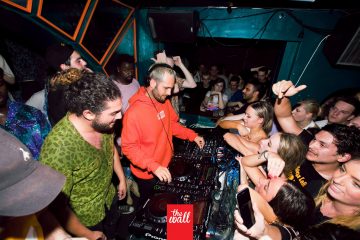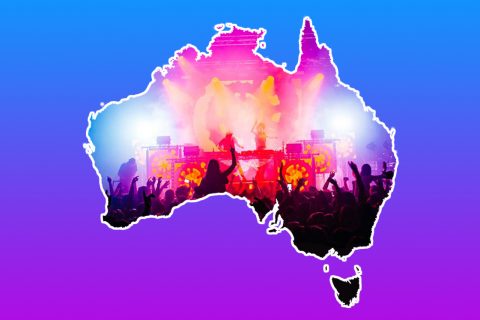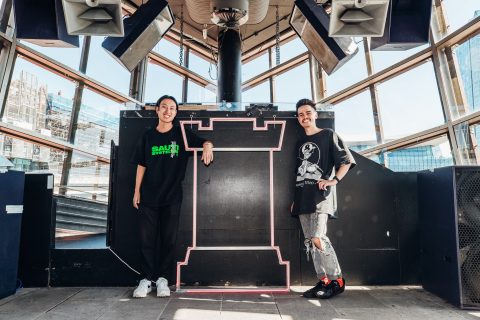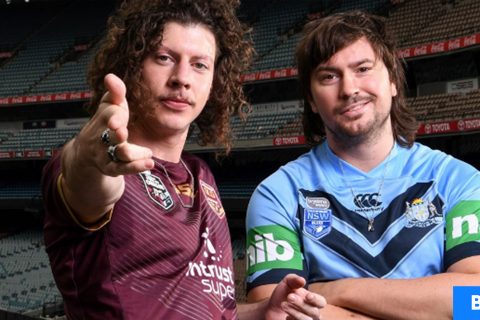This is part 2 in a series of long form articles with Electronic Music Conference. Read part 1 on ‘The Future of Radio’ here.
Oh Australia. A music industry that’s small but mighty. Our geographical isolation, too-slow-for-comfort internet speeds, and crippling arts funding cuts haven’t seemed to halt our creative output in the slightest. Our list of international exports smashing goals is strong, and growing by the day.
“Australia is certainly a couple years ahead of the States in electronic music trends and tastes” says Falcona co-founder, Chris Murray. “It’s perhaps the only piece of the popular culture puzzle that we do not take their lead on.” Why’s this? “We’re a small country with high competition and not a lot of opportunities for touring, radio play, or TV performances. Artists here really need to be innovative and push the boundaries a bit more to get noticed, which I think ultimately is a good thing. No time for complacency here.” says FBi Radio music director, Amelia Jenner.
But that’s not to say the challenges Aussie musicians face on the come up aren’t significant. How do you earn enough money to not have to exist on packet ramen for months, whilst also dedicating enough time to your project? With so many small venues shutting down, how can you get your first few gigs? With limited avenues for exposure, how can you actually get people to pay attention? But when these problems are overcome, the results are phenomenal.
So how can young artists achieve their goals in this mixed climate? Well, we don’t claim to have all the answers. But we do have plenty of answers from the mouths of people that have actually done it, or have shaped the careers of your favourite musos. We’ve spoken to and gathered the most important tips from Australian artists, managers, public relations execs, booking agencies, event organisers, venues, and online publications, to help young musicians wrap their head around how to smash their goals within the Australian market, and beyond.
The wonders of the internet
It’s thought to be a given, but the world wide web is not the key to your success. It’s more of a tool. It’s what you do with it that makes all the difference. You need to stand out from the hoards of tunas floating about in the sea, and most of that will come from, as Adam Hyde of Peking Duk suggests, “just doing you.” This requires a bit more effort than throwing your track on Soundcloud, making a Facebook page, and calling it a day.
Chris Murray, director of all-rounder music agency/all-round legends, Falcona, suggests that letting your personality shine through your content, and emphasising your points of difference, is likely to be well-recepted. “Branding is hugely important, more important than a lot of artists realise. Perception is reality, and you don’t get a 2nd chance at a first impression. The digital tools we use to brand have changed since Myspace, and because of that, people seem to see through the bullshit a lot more, so being genuine is pretty important. As is living your brand. Understanding that the perception and scrutiny of your brand is constant and should be separated from who you are as a person, unless you’re happy to blur those lines.” he says.
However, know where and when to draw the line. “As important as it is, what I don’t like is style over substance, which is certainly more prevalent now than ever before. Give me a humble, poorly dressed, dishevelled, prodigious musical talent over a flamboyant, talentless, underproduced, overmarketed, narcissistic blank of a human any day of the week!” he says.
PR pro Hannah Celnikier, who works at Positive Feedback, encourages musos to use the platforms so readily available to us, and all of them. “Focus on interesting and engaging content across your platforms. Interacting with your fan base and the wider community is essential.” she says.
In summary? Many benefit from giving their audience consistent, captivating content. Some artists can get away with being an enigma on social media and in all other facets, if it’s a part of their appeal. In the end, its about what you think best suits you and your project. However, making sure your music is easily accessible by those who want to hear it is an essential.
Getting those gigs:

Daniel Andaloro, event coordinator at The Wall, has seen an endless stream of DJ’s and producers step behind the decks. And plenty of them are well on their way, with Enschway, Kuren, Swindail, and Badrapper being just a few of the alumni making waves both in Australia and internationally. He had a few tips to give those hoping to snag a spot on any line up.
“Don’t waste any opportunities. If you get booked to play an open set to an empty dancefloor, take that chance to show the promoter what you can do. Play to the time and the vibe and have the self-control not to drop Core before midnight. Don’t take any booking for granted because it could be the one that the right person notices that you have something special.”
In terms of how to actually get the gig? Daniel says to do your thing, and the bookings will fall upon you.
“I always have my eye on what people are putting out there… a massive “do” for me is just to focus on the music you are creating, making sure each release is stronger than the last; I have no doubt I will be coming to you, not the other way around. Which is far more rewarding for both parties. We try our best to be one step ahead in our bookings and helping the artists who are killing it to get to that next step. The less you hassle any promoter for more bookings the better. Personally, I try my best to give everyone who is pushing themselves a fair go but it does get overwhelming and makes it harder to filter through everyone asking.” he says.
Expanding your circle:
A perk of existing within a small music industry is that no one person is likely more than a few degrees of separation away. It’s time to get used to the idea of meeting the people that work behind the scenes and in front of them. Being surrounded by people on the same road as you, people on the business side of the plate, or other related industries, is nothing but beneficial to you. Most importantly, beautiful friendships can be built on this common ground.
“Australia, being small, makes it a pretty supportive industry as well – we all just wanna see each other succeed, while also creating a healthy level of competition among artists who support and build each other up. It also provides impetus to try and work harder and do better when you see people close to you succeed, and you’re able to lean on them for ideas and help to do so yourself.” says Troy Mutton, editor of Pilerats.
Adam Hyde from Peking Duk started out on the club rounds within Canberra, and also stressed its importance. “Network as much as you can. Meet as many people in the scene as you possibly can. People always wanna talk, so never be shy. Ask them questions and try and learn as much as you can, because knowledge is power, and the more that you know, the better you are at everything.” he says.
Wherever you are in Australia, if you look hard enough, there has to be events for your particular music niches, where people are likely friendly and welcoming to artists who do the same things as them. And if there isn’t, well, there is always the internet.
Want some media love?
We were lucky enough to grab a hold of Troy Mutton, editor of WA-based music and lifestyle blog Pilerats. He’s expectedly, a well-versed recipient in the art of the music pitch. We asked him, and our other interviewees, what to do and what not to do when trying to get your shiny new single some media love.
- Put in some elbow grease. “If you try to go a bit further than just a submissions email address, it shows you’re willing to put in a bit more effort straight off the bat. Dig around a bit, find a writer you like’s Twitter. Establish a relationship. One strong relationship with a blog or writer is worth more than 100 cold emails.”
- Be on top of your game. “Don’t send through demos. Your music should be at a quality that you’d want it to be heard by bigger audiences.” he says.
- Be relevant. “Make sure the music you’re pitching is actually relevant to the blog.” Troy says. Sasha Skalrud, artist manager, adds, “Look for a segment or feature the website runs and pitch specifically for it, rather than a, “Hey, please write about me.”
- Don’t make it difficult. “When you send info through make sure everything’s there – press info, bio, track links, press pic – make the process of me learning more about you as easy as possible and not require some back-and-forth that I don’t have time for.
- Be persistent – but have common sense. “I am terrible at replying to emails, but I will get there eventually, and if your music is good enough I’ll always make the effort, it might just take a while. But don’t be aggressive about it.”
Troy also spoke on some of the downsides to existing within a small industry, which affect media opportunities. “The size of the industry can feel a little limiting in terms of how you get exposure. Triple j is very much the go-to for artists trying to break out, and if they don’t pick you up it can be deflating for some who begin to wonder what avenues they have if that one doesn’t work out. But I think artists who really love what they do and back what they do will find other avenues to success, sometimes it’s just hard for people to see past it.” he says.
Time for a team?
If the emails are piling up and running the business side is effecting your ability to work on your craft, or even if you’re just wanting to get some structured assistance from industry professionals, it may be time to seek the assistance of a manager, publicist, or booking agency. Whenever choosing someone to plan and develop a particular part of your career, there are some important considerations you should keep in mind.
Sasha Skalrud leads the one-man-show of Skalrud Management, and has built the careers of acts like Golden Features, Enschway, and Zeke Beats. When asked about how artists should approach the delicate process of management selection, he said, “Find someone that truly believes in what you’re doing and feels just as passionate about the project as you do. Never rush into things. Have many conversations, pick their brains, ask them what they’d do differently, or what their plans for the project would be.”
In terms of publicity, there are plenty of fantastic agencies who will put the hard yards into shining the media spotlight on your work through their contacts, reputation, and campaigns. But only when the time is right. “If you’re a developing artist, it’s often more beneficial to continue the grassroots approach. This way, you can identify your potential and existing fanbase, build your social media and streaming statistics.” says Hannah Celnikier of Positive Feedback. She also suggests identifying your PR-specific goals and aims before contacting agencies. “What are you looking to achieve by bringing a publicist on board? Radio play? Establishing a profile? Building upon an existing story? Tour promotion?” she says. The moral of the story is, that with the right timing and preparation, you can make it a whole lot easier for PR agencies to do a better job for your music.
The Big One:
Within every interview conducted for this article, there was a persisting theme that is often said, but can never be said enough. The distinction between those smashing their goals and the ones that get left behind is plain, simple, hard work. When asked what overarching advice they would give to young musicians, here’s what our interviewee’s had to say.
“Don’t just have big goals. It’s important to create mini-goals along the way to truly gauge progress. Be constantly learning, networking, and supporting other people in your scene. Don’t wait for inspiration to hit you – work everyday. If you’re stuck, go watch a tutorial on something that you consider a weakness and strengthen your abilities.” says Sasha Skalrud.
“Work hard. Spend as much time as humanly possible writing music. Build a good team around you and let them help ease the workload so you can focus on being creative. For every song you release, there should be 50 you don’t. Collaborate with different artists, mix it up. Mainly don’t be lazy. So many people are lazy, I don’t get it. If you’re not working 12 hours a day every day you don’t want it enough.” says Chris Murray.
“Do you. It sounds very corny and very cliche but it’s 100% true. Don’t follow trends because by the time you’ve finished perfecting that craft, that trend is gonna pass, and your music is gonna be irrelevant. Do what you actually think is true inside yourself, because at the end of the day, thats going to resonate. Be persistent, work hard, put your head down, and don’t listen to any nay-sayers. ” says Adam Hyde.
–
So there you have it! We figured the best way to explain this topic was to enlist a few pros, so hopefully their insight into kicking goals in their own backyard goes a long way for you!
If you want to learn more on this, you can head along to Electronic Music Conference for an exclusive talk on the subject from some other pros such as Eva Trifonas, Incgnto, Huw Nolan, Good Manners and more. See more details on EMC below.
Electronic Music Conference 2017 visits Sydney’s Redfern for a two-day program seeing international music leaders and industry experts appear across an array of panels, talks, workshops, parties and masterclasses on November 29-30. Tickets are on sale now via electronicmusicconference.





Comments